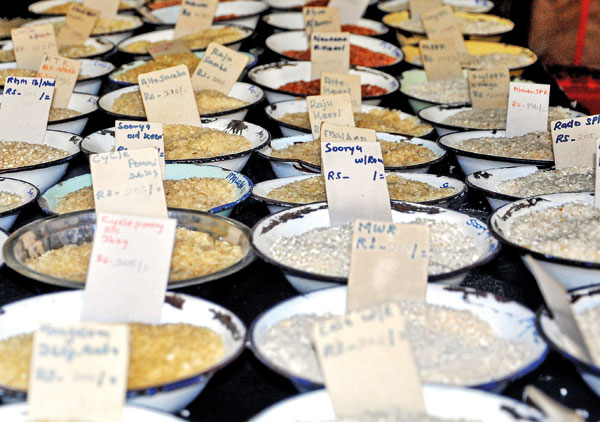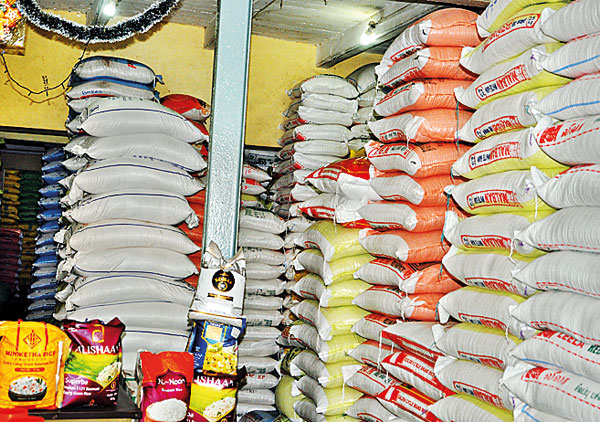News
Rice price may hold steady, but some varieties already cost more
View(s):By Senuka Jayakody
Wholesalers say the price of some rice varieties has already risen.
The Paddy Marketing Board is also expected to release some stocks into the market and this is expected to keep prices in check.
This week, a gazette signed by President Ranil Wickremesinghe as Finance Minister, banning the import of semi-milled or wholly milled, raw and parboiled rice was issued.

Import ban a little too late: Wholesalers say the price of some rice varieties has already risen. Pix by Priyanka Samaraweera
The deputy general manager of the Paddy Marketing Board and a senior researcher of the Hector Kobbekaduwa Agrarian Research and Training Institute, W. H. Duminda Priyadarshana said prices may not change.
The PMB has bought 72,000 metric tonnes in the previous Maha season, from which 7,000 MT remains in its possession.
The PMB bought just 7,000 MT during Yala, and this is expected to be released onto the market in the next two weeks.
Mr. Priyadarshana said the gazette was welcome. “A good decision even though late.’’
In the Maha and Yala seasons, there was a shortage of around 600,000 MT as predicted. Only 1.8 million MT were harvested compared with 2.4m MT produced in a normal year.
“It is the Government’s responsibility to ensure food security, so rice must be imported from somewhere, if there is not enough rice,’’ he said.
Following the gazette, the price of paddy has increased. A bag of 64 kilos of paddy sold for Rs. 6,000 on Monday this week, had increased to Rs. 6,500 or Rs. 6,600 by Thursday.
However, a drastic increase in retail prices is not expected as farmers are now releasing paddy, which they had stocked for the festive season.
“Farmers can see a good Maha season coming, so they can release paddy to the market with no fear of food insecurity. The shortage created from the lack of imports will be filled by local rice, leaving almost no impact on the consumer,’’ he explained.
Mr. Priyadarshana expects the price of imported rice to rise to the level of local paddy.

Farmers can see a good Maha season coming, so they can release paddy to the market with no fear of food insecurity, says PMB. Pix by Jayantha Wickramaarachchi
He expects a considerable drop in prices of local paddy after February, with the Maha harvest being reaped from the middle of January to the middle of April, which he referred to as “normal”, due to an abundance of paddy at the time of the year.
Anuradha Tennakoon, the president of the National Agrarian Unity, involved in getting the gazette passed, said the damage has already been done.
He explained that when paddy reserves of about 1.5 million MT were available, the Government did not have Rs. 2 billion to purchase it, but had funds to import rice worth Rs. 72 billion in 2022. He blames officials for corruption.
“Sri Lanka has the highest prices in South Asia for paddy. Other countries provide subsidies and other facilities to farmers, so that farmers can sell paddy at lower prices”, Mr. Tennakoon said.
In Sri Lanka, farmers incur a loss, selling at the current price of Rs. 90, while investing Rs. 190,000 in a hectare. There are also taxes to pay. “If facilities are provided, we can sell paddy at Rs. 60 or Rs. 70 per kilo,’’ he said.
The president of the United Rice Producers Association, Mudith Perera, said the gazette notice was late by three months.
“If the gazette was passed back in September, we could have prevented more dollars from being spent,’’ he said. About 75% of the 1,000 small millers have shut down.
The convener of the Pulathisi Farmers and Traders Organisation, Ven. Dimbulagala Rahulalankara Thero, said that 8,000 MT had been imported, which is more than 50% of the Yala season crop of 13,000 MT. “The gazette is a joke. These people have already destroyed agriculture and the country. The old people should leave.’’
The media spokesman of the Essential Food Commodities Importers and Traders Association, Nihal Seneviratne, said that a better option would be to impose Customs duty, instead of an import ban. 
“When imports are banned, the local rice millers and intermediaries who stock paddy will definitely take advantage and raise the prices. When there was a fertiliser issue in the country, it was imported rice which fed the population,’’ Mr. Seneviratne said.
A wholesaler in the Pettah said he could not make forecasts, but prices could rise. “The price is decided according to demand and supply. Neither a decline nor a rise can be exactly predicted. With the gazette banning imports, the prices of some varieties have already gone up. The price of rathu kekulu has risen.’’
The best way to say that you found the home of your dreams is by finding it on Hitad.lk. We have listings for apartments for sale or rent in Sri Lanka, no matter what locale you're looking for! Whether you live in Colombo, Galle, Kandy, Matara, Jaffna and more - we've got them all!

